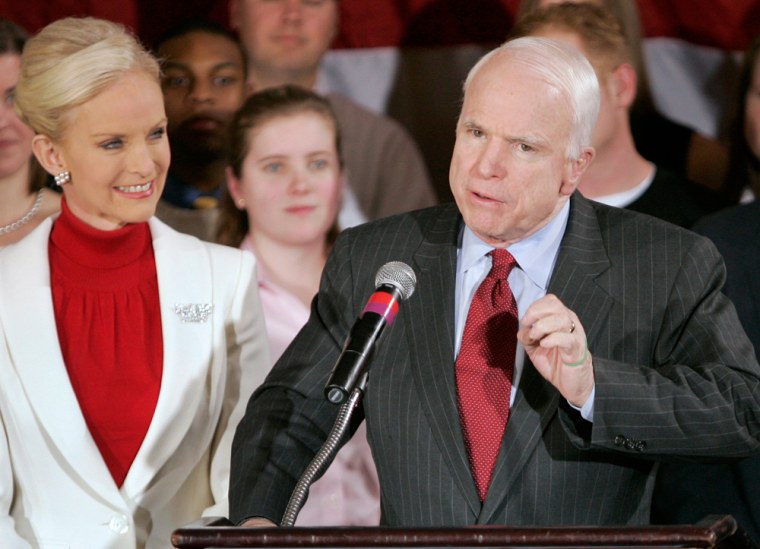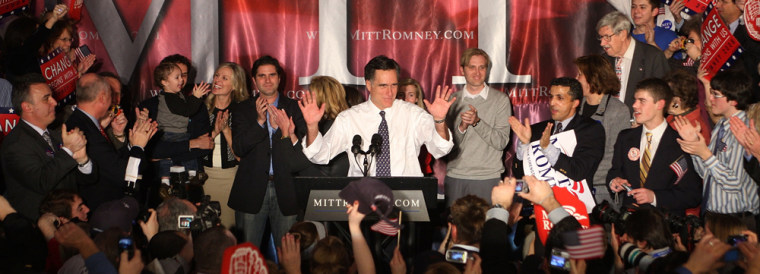Mitt Romney won the Republican presidential primary in his native Michigan on Tuesday, a victory that gave his candidacy new life and set the stage for a wide-open showdown in South Carolina in just four days.
Romney's victory over Sen. John McCain further roiled a volatile nomination fight that lacks a clear favorite.
"Tonight is a victory of optimism over Washington-style pessimism," Romney said Tuesday night, celebrating his triumph in Southfield, Mich.
Early election returns showed Romney, the former Massachusetts governor, leading with about 39 percent of the vote to McCain's 30 percent. Mike Huckabee, the former Arkansas governor, trailed with 16 percent.
Romney, whose late father once was Michigan's governor, promised a fight in South Carolina.
"Let’s take this campaign all the way to the White House!” an exuberant Romney told supporters who interrupted him with shouts of “Mitt, Mitt, Mitt!” and “Let’s go!”
In the virtually uncontested Democratic primary, Sen. Hillary Rodham Clinton received the most votes. As a result of a dispute between the Michigan Democrats and the national party over the primary's timing, Clinton was the only major candidate on the ballot, and no delegates will be awarded in that contest.
Four contests, three winners
The Republican race now has seen three winners in four contests: Huckabee in Iowa, McCain in New Hampshire and Romney in barely contested Wyoming and now Michigan.
Romney's roots helped him in Michigan. He was born and raised in the state and his late father, George, was head of American Motors and a three-term governor in the 1960s. Romney announced his presidential candidacy in Michigan a year ago.
He campaigned in the state far more than his rivals and spent more than $2 million in TV ads in Michigan, nearly three times what McCain did, according to an analysis of presidential advertising by the nonpartisan Michigan Campaign Finance Network.

Four in 10 voters said Romney's roots factored into their votes, and more than half of that group backed Romney, according to surveys of voters as they left their polling places, taken for NBC News, the other TV networks and The Associated Press. He also led among voters who said the economy and illegal immigration were their most important issues, and won a majority of Republicans, conservatives, and voters looking for a candidate with experience.
McCain had an edge with those who said they wanted an authentic president, and he won among moderates, independents and Democrats. But independents and Democrats accounted for roughly one-third of the vote, compared with about one-half in 2000 when those voters helped him beat George W. Bush.
"For a minute there in New Hampshire I thought this campaign might be getting easier," McCain said in Charleston, S.C. "But you know what? We’ve gotten pretty good at doing things the hard way and I think we’ve shown them that we don’t mind a fight.”
Huckabee, also already campaigning in the next primary state, said in Lexington, S.C.: "We're going to win South Carolina. We put a flag in the ground here Saturday." He also jabbed at Romney, who has poured at least $20 million of his personal fortune into his bid: "We need to prove that electing a president is not just about how much money a candidate has."
Of the three candidates who competed hard in Michigan, Romney needed a victory the most to right a bid weakened by the searing losses in Iowa and New Hampshire. He was the only one to watch the voting returns in Michigan; his top Michigan opponents, McCain and Huckabee, campaigned in Michigan earlier but flew out of the state by afternoon to plant themselves in South Carolina, which votes Saturday.
Feeling optimistic in the run-up to the Michigan voting, Romney went back on the air with TV ads in South Carolina after a brief hiatus.
Fred Thompson, a former Tennessee senator, has been camping out in South Carolina looking for his first win. Rudy Giuliani, the former New York mayor, is doing the same in Florida, which votes Jan. 29.
Guiliani adviser Tony Carbonetti congratulated Romney on his Michigan win.
"It's clear after tonight that while the race remains fluid and competitive, our strategy remains on track," Carbonetti said. "Rudy is going to continue to campaign aggressively in Florida, and after the energy we've seen on the trail this past week, we're confident that we'll be successful on the 29th."
Low turnout in Michigan
A mere 20 percent of eligible voters had been expected to show up at polling stations across frigid and snowy Michigan, and turnout likely was depressed by a Democratic race of little to no consequence.
Michigan doesn't typically hold its primary until February but state party officials scheduled it earlier to try to give the state more say in picking a president.
The Republican National Committee objected and cut the number of Michigan delegates to the national convention by half as punishment.
Romney was allocated 23 of the 30 delegates. McCain received six and Huckabee one.
The Democratic National Committee stripped Michigan of all of its delegates because of the early primary. Several Democratic presidential candidates requested in writing to have their names pulled from the ballot.
So Clinton was the only top Democratic contender on the ballot.
She was joined by Rep. Dennis Kucinich, former Sen. Mike Gravel and "uncommitted." Supporters of Democrats John Edwards and Barack Obama, who did not appear on the ballot, had encouraged voters to vote "uncommitted," and a substantial number did.
About 20 counties reportedly were unable to count their Democratic ballots for "uncommitted" because the vendor misprogrammed the vote counting equipment. They were having to hand count them like they count write-in votes.
Sen. Chris Dodd, who has dropped out the race, was on the ballot, and there was a write-in option.
